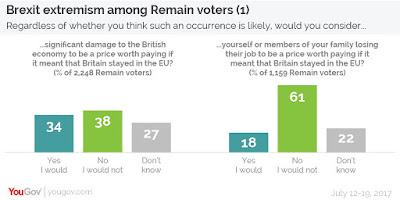Philip Hammond said some months ago that "the British people did not vote on June 23rd to become poorer, or less secure.". Some are saying the YouGov poll suggests they did. That's wrong. We need to take a closer look at the results, and what the poll actually means for Brexit.
But first let's look at another poll being carried out now on Twitter by Rupert Myers, one of the team behind "Jeremy Corbyn The Musical". Over 500 people this time, and this is the result so far:
On the face of it 19% of the country are terrorists or spies. Clearly nonsense. Point is that people don't take polls seriously. There's no reason to be honest, and they are more likely to tick an extremist option. But a 83: 17 result in support of encryption is probably about right. Polls do have some value, if reviewed carefully.
With this in mind, let's look at the YouGov poll. The two diagrams are for Leave voters and Remain voters. There should also presumably be a "Didn't Vote" equivalent, but I haven't seen it published.
Firstly for Leave Voters
Secondly for Remain Voters
Would a cost be worth it?
- On the left is a question about economic harm
- On the right on losing their own job (or one of their family).
So, let's halve the 34% and 18% scores to 17% and 9% respectively, say, and do the maths:
- Economic harm: 61% of 2043 Leave voters and 17% of 2248 Remain voters is 1246 +382 out of 4291 is 38%, well below half
- Lose job: 39% of 2043 Leave voters and 9% of 2248 Remain voters is 797 + 72 out of 4291 is 20%, only one fifth
So did the British people vote on June 23rd to become poorer, or less secure? If 38% or less voted to allow it, it is clear the vast majority did not.
The YouGov poll also suggests the economic issues would override other considerations, which people are presumably considering when answering the questions in the poll.
The UK Government need to keep that all firmly in mind during the Brexit negotiations. If Brexit looks like it would hit the economy and jobs, then let's stop Brexit.





No comments:
Post a Comment